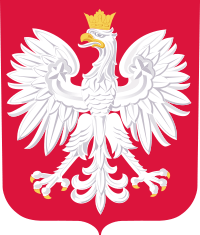The Republicans (Poland)
The "Republicans" is a Polish conservative and republican political association, founded in 2013.
Republicans Stowarzyszenie "Republikanie" | |
|---|---|
| Leader | Karol Rabenda |
| Founded | 22 June 2013 |
| Split from | Law and Justice |
| Ideology | Social conservatism Economic liberalism Soft euroscepticism |
| Website | |
| https://republikanie.org | |
 |
|---|
| This article is part of a series on the politics and government of Poland |
|
|
Related topics
|
|
|
History
On 3 June 2013, the founder of the Republican Foundation, Przemysław Wipler, left the Law and Justice party, announcing the creation of a new political organisation which would be called the "Republicans".[1] The "Republicans" was registered as a political party on 2 August. On 22 August, the party held its founding convention, which hosted, among others, Paweł Kukiz.[2] Przemysław Wipler was appointed president, and Anna Streżyńska appointed vice president.[3] On November 23, following the election of the new government, Przemysław Wipler continued as president, defeating Annę Streżyńska at the vote.
At the beginning of 2014 Anna Streżyńska left the "Republicans". On 20 February 2014, a group of "Republicans" activists, led by Przemysław Wipler and Luke Sparrow, left Poland.[4][5] On 10 March, Przemysław Wipler concluded a cooperation agreement with the Congress of the New Right.[6] Some "Republicans" activists, led by Jacek Sierpinski, would later join the Libertarian Party.
In January 2015, many "Republicans" activists supported KORWiN, and Przemysław Wipler became the party's vice president. In the parliamentary elections to the Sejm, the party fielded two candidates, Magdalena Błeńska and Tomasz Jaskóła, and several others associated with the Republican Foundation. On 28 November 2015, at the Third Congress of the "Republicans", Przemysław Wipler stepped down as president, and was replaced by Karol Rabenda, who at the same time led KORWiN in Pomerania.
On 23 February, Karol Rabenda, then president, resigned from the party, as did Magdalena Błeńska, then vice president, and "Republicans" member Anna Siarkowska too resigned and caucused with Kukiz'15.[7].
Program
The "Republicans" advocate the creation of single-member constituencies and online voting, as well as enhanced direct democracy. The "Republicans" are also committed to reducing taxes, and the simplification of the tax system. The party also advocates reducing the number of posts in the public administration by at least one-fifth.
The party's family policies include the introduction of a two-year paid maternity leave, the introduction of school vouchers and increased child tax credits. The party is also committed to the "deregulation" of the economy, and the replacement of the Social Insurance Institution and the Agricultural Social Insurance Fund.[8]
References
- "Republicans ASSOCIATION". Retrieved 20 June 2017.
- Agata Kondzińska (22 June 2013). "Kukiz u republikanów: Połączymy siły i rozpirzymy ich w dym!". wyborcza.pl. Retrieved 20 June 2017.
- Łukasz Głombicki (1 November 2013). "Wipler nie jest już szefem Stowarzyszenia Republikanie. Zastąpi go Streżyńska". Retrieved 24 February 2017.
- "Jarosław Gowin: Przemysław Wipler poza Polską Razem". 20 February 2014. Retrieved 24 February 2017.
- Paweł Majewski (21 February 2014). "Wipler odchodzi, część Republikanów z Gowinem". Retrieved 24 February 2017.
- "Przemysław Wipler i Janusz Korwin-Mikke podpisali porozumienie programowe". 10 March 2014. Retrieved 24 February 2017.
- "Republikanie w Sejmie. Powstało nowe koło poselskie". 24 February 2017. Retrieved 24 February 2017.
- "Priorytety dla Polski". republikanie.net. Retrieved 24 February 2017.